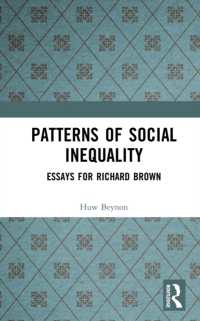Full Description
This book brings together leading scholars from around the world to provide their most influential thinking on instructional feedback. The chapters range from academic, in-depth reviews of the research on instructional feedback to a case study on how feedback altered the life-course of one author. Furthermore, it features critical subject areas - including mathematics, science, music, and even animal training - and focuses on working at various developmental levels of learners. The affective, non-cognitive aspects of feedback are also targeted; such as how learners react emotionally to receiving feedback. The exploration of the theoretical underpinnings of how feedback changes the course of instruction leads to practical advice on how to give such feedback effectively in a variety of diverse contexts. Anyone interested in researching instructional feedback, or providing it in their class or course, will discover why, when, and where instructional feedback is effective and how best to provide it.
Contents
Foreword Valerie Shute; Preface Anastasiya A. Lipnevich and Jeffrey K. Smith; Part I. Theoretical Foundations: Methods and Concepts: 1. Feedback: at the heart of - but definitely not all of - formative assessment Dylan Wiliam; 2. Becoming proficient: an alternative perspective on the role of feedback Gordon Stobart; 3. Summative and formative feedback Susan M. Brookhart; 4. Toward a taxonomy of written feedback messages Jacqui Murray, N. Ruth Gasson and Jeffrey K. Smith; 5. Methods in feedback research Gavin T. L. Brown and Lois R. Harris; Part II. Domain-Specific Feedback: 6. Assessment feedback in primary schools in Singapore and beyond Kelvin H. K. Tan and Hwei Ming Wong; 7. Instructional feedback in writing Steve Graham; 8. Instructional feedback in mathematics Marian Small and Amy Lin; 9. Looking closely at mathematics and science classroom feedback practices: examining artifacts, students' products and teachers' communications Maria Araceli Ruiz-Primo and Heidi Kroog; 10. Instructional feedback in music Kelly A. Parkes; 11. Feedback and noncognitive skills: from working hypotheses to theory-driven recommendations for practice Dana Murano, Jonathan E. Martin, Jeremy Burrus and Richard D. Roberts; 12. Feedback in tertiary education: challenges and opportunities for enhancing current practices Jacques van der Meer and Phillip Dawson; 13. Instructional feedback in medical education Joan Sargeant and Christopher Watling; 14. The 360-degree feedback at workplace: a transformative learning perspective Vidya S. Athota and Ashish Malik; Part III. Contexts and Sources of Feedback: 15. Technology-enhanced feedback Cassim Munshi and Christopher C. Deneen; 16. Feedback and game design Bruce D. Homer, Teresa M. Ober and Jan L. Plass; 17. Feedback in the context of self-assessment Heidi L. Andrade; 18. Providing formative peer feedback: what do we know? Ernesto Panadero, Anders Jonsson and Maryam Alqassab; 19. Feedback, correctives, and the use of pre-assessments Thomas R. Guskey; 20. Teacher expectations and feedback practices in South African schools Anil Kanjee; 21. Interactive assessment: cultural perspectives and practices in the nexus of 'heart or mind' Masahiro Arimoto and Ian Clark; 22. Instructional feedback in animals Allison B. Kaufman and Michele M. Pagel; Part IV. Student Responses to Feedback: 23. The emotional dynamics of feedback from the student's point of view Rick Stiggins; 24. Facilitating students' active engagement with feedback Anders Jönsson and Ernesto Panadero; 25. Performance feedback and emotions Thomas Goetz, Anastasiya A. Lipnevich, Maike Krannich and Katarzyna Gogol; 26. The relationship between creativity and feedback Molly Holinger and James C. Kaufman; Part V. Concluding Remarks: 27. Instructional feedback: analysis, synthesis, and extrapolation Jeffrey K. Smith and Anastasiya A. Lipnevich.








